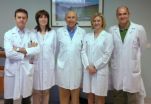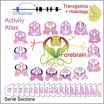(Press-News.org) An international study led by King's College London has identified a new genetic variant associated with stroke. By exploring the genetic variants linked with blood clotting – a process that can lead to a stroke – scientists have discovered a gene which is associated with large vessel and cardioembolic stroke but has no connection to small vessel stroke.
Published in the journal Annals of Neurology, the study provides a potential new target for treatment and highlights genetic differences between different types of stroke, demonstrating the need for tailored treatments.
About 15 million people worldwide suffer a stroke each year. Of these, five million die and another five million are left permanently disabled, according to numbers from the World Health Organization (WHO). Risk factors for a stroke are high blood pressure, a heart rhythm disorder, high blood cholesterol, tobacco use, unhealthy diet, physical inactivity, diabetes and advancing age.
A stroke occurs when the blood supply to the brain is cut off, often due to a blood clot blocking an artery that carries blood to the brain, which then leads to brain cell damage. Coagulation (blood clotting) abnormalities, particularly easy clotting of the blood, are therefore common contributing factors in the development of stroke.
Dr Frances Williams, Senior Lecturer from the Department of Twin Research and Genetic Epidemiology at King's and lead author of the paper, said: 'Previous studies have demonstrated the influence of genetic factors on the components of coagulation. The goal of this study was to extend these observations to determine if they were further associated with different types of stroke.'
The research was carried out in three stages. The first consisted of a genome-wide association study (GWAS) in 2100 healthy volunteers which identified 23 independent genetic variants that were involved in coagulation. The second stage examined the 23 variants in 4200 stroke and non-stroke cases from centres across Europe (Wellcome Trust Case Control Consortium 2 and MORGAM collections) and found that a particular mutation on the ABO gene was significantly associated with stroke.
Stage three of the study used the MetaStroke cohort, a project of the International Stroke Genetics Consortium which comprises 8900 stroke cases recruited from centres in the Europe, USA and Australia, whose DNA has been collected and undergone GWA scan. It was confirmed that a variant in the ABO blood type gene was associated with stroke, a finding specific to large vessel and cardioembolic stroke.
Dr Williams said: 'The discovery of the association between this genetic variant and stroke identifies a new target for potential treatments, which could help to reduce the risk of stroke in the future. It is also significant that no association was found with small vessel disease, as this suggests that stroke subtypes involve different genetic mechanisms which emphasises the need for individualised treatment.'
###
CONTACT
For further media information please contact:
Marianne Slegers
International Press Officer.
Notes to editors:
Link to the Annals of Neurology: http://onlinelibrary.wiley.com/journal/10.1002/(ISSN)1531-8249.
Full title of the publication: Ischaemic stroke is associated with the ABO locus: the Euroclot study.
For further information about facts and figures from WHO's on cardiovascular diseases go to: http://www.who.int/cardiovascular_diseases/resources/atlas/en/.
About King's College London
King's College London is one of the top 30 universities in the world (2011/12 QS World University Rankings), and the fourth oldest in England. A research-led university based in the heart of London, King's has nearly 23,500 students (of whom more than 9,000 are graduate students) from nearly 140 countries, and some 6,000 employees. King's is in the second phase of a £1 billion redevelopment programme which is transforming its estate.
King's has an outstanding reputation for providing world-class teaching and cutting-edge research. In the 2008 Research Assessment Exercise for British universities, 23 departments were ranked in the top quartile of British universities; over half of our academic staff work in departments that are in the top 10 per cent in the UK in their field and can thus be classed as world leading. The College is in the top seven UK universities for research earnings and has an overall annual income of nearly £450 million.
King's has a particularly distinguished reputation in the humanities, law, the sciences (including a wide range of health areas such as psychiatry, medicine, nursing and dentistry) and social sciences including international affairs. It has played a major role in many of the advances that have shaped modern life, such as the discovery of the structure of DNA and research that led to the development of radio, television, mobile phones and radar. It is the largest centre for the education of healthcare professionals in Europe; no university has more Medical Research Council Centres.
New stroke gene discovery could lead to tailored treatments
An international study led by King's College London has identified a new genetic variant associated with stroke
2013-02-01
ELSE PRESS RELEASES FROM THIS DATE:
Discovery in synthetic biology takes us a step closer to new 'industrial revolution'
2013-02-01
The scientists, from Imperial College London, say their research brings them another step closer to a new kind of industrial revolution, where parts for these biological factories could be mass-produced. These factories have a wealth of applications including better drug delivery treatments for patients, enhancements in the way that minerals are mined from deep underground and advances in the production of biofuels.
Professor Paul Freemont, Co- Director of the Centre for Synthetic Biology and Innovation at Imperial College London and principle co-investigator of the study, ...
The genome of rock pigeon reveals the origin of pigeons and the molecular traits
2013-02-01
January 31, 2013, Shenzhen, China – In a study published today in Science, researchers from University of Utah, BGI, and other institutes have completed the genome sequencing of rock pigeon, Columba livia, among the most common and varied bird species on Earth. The work reveals the evolutionary secrets of pigeons and opens a new way for researchers to study the genetic traits controlling pigeons' splendid diversity. The findings also help to fill the genetic gaps in exploiting pigeon as a model for the molecular genetic basis of avian variation.
People are quite familiar ...
Placental blood flow can influence malaria during pregnancy
2013-02-01
Malaria in pregnancy causes a range of adverse effects, including abortions, stillbirths, premature delivery and low infant birth weight. Many of these effects are thought to derive from a placental inflammatory response resulting from interaction of infected red blood cells with the placental tissue. In a study published in the latest issue of the journal PLOS Pathogen*, a researchers' team led by Carlos Penha-Gonçalves at the Instituto Gulbenkian de Ciência (IGC), Portugal, observed, for the first time, the mouse placental circulation and showed how it can influence the ...
Sequencing hundreds of chloroplast genomes now possible
2013-02-01
Researchers at the University of Florida and Oberlin College have developed a sequencing method that will allow potentially hundreds of plant chloroplast genomes to be sequenced at once, facilitating studies of molecular biology and evolution in plants.
The chloroplast is the compartment within the plant cell that is responsible for photosynthesis and hence provides all of the sugar that a plant needs to grow and survive. The chloroplast is unusual in containing its own DNA genome, separate from the larger and dominant genome that is located in every cell's nucleus. ...
Examining the so-called Basque mutation of Parkinson's
2013-02-01
This press release is available in Spanish.
The relationship between genetics and Parkinson's has been investigated for more than a decade, but it is only over the last few years that significant results have begun to be obtained. The first mutations related to the development of this disease were found in 2004. A team from the UPV/EHU-University of the Basque Country came across a mutation of the LRRK2 gene, which is particularly prevalent among the population of Gipuzkoa. It is the R1441G mutation and is known as the Basque mutation. Now, Doctor Javier Ruiz, a doctor ...
NASA sees a coronal mass ejection erupt from the sun
2013-02-01
On Jan. 31, 2013 at 2:09am EST, the sun erupted with an Earth-directed coronal mass ejection or CME. Experimental NASA research models, based on observations from the Solar Terrestrial Relations Observatory (STEREO) and ESA/NASA's Solar and Heliospheric Observatory, show that the CME left the sun at speeds of around 575 miles per second, which is a fairly typical speed for CMEs. Historically, CMEs at this speed are mild.
Not to be confused with a solar flare, a CME is a solar phenomenon that can send solar particles into space and reach Earth one to three days later.
Earth-directed ...
The effective collective: Grouping could ensure animals find their way in a changing environment
2013-02-01
For social animals such as schooling fish, the loss of their numbers to human activity could eventually threaten entire populations, according to a finding that such animals rely heavily on grouping to effectively navigate their environment.
Princeton University researchers report in the journal Science that collective intelligence is vital to certain animals' ability to evaluate and respond to their environment. Conducted on fish, the research demonstrated that small groups and individuals become disoriented in complex, changing environments. However, as group size is ...
Evidence of geological 'facelift' in the Appalachians
2013-02-01
How does a mountain range maintain its youthful, rugged appearance after 200 million years without tectonic activity? Try a geological facelift – courtesy of the earth's mantle.
Researchers from North Carolina State University noticed that a portion of the Appalachian Mountains in western North Carolina near the Cullasaja River basin was topographically quite different from its surroundings. They found two distinct landscapes in the basin: an upper portion with gentle, rounded hills, where the average distance from valley to mountain top was about 500 feet; and a lower ...
Genome-wide atlas of gene enhancers in the brain online
2013-02-01
Future research into the underlying causes of neurological disorders such as autism, epilepsy and schizophrenia, should greatly benefit from a first-of-its-kind atlas of gene-enhancers in the cerebrum (telencephalon). This new atlas, developed by a team led by researchers with the U.S. Department of Energy (DOE)'s Lawrence Berkeley National Laboratory (Berkeley Lab) is a publicly accessible Web-based collection of data that identifies and locates thousands of gene-regulating elements in a region of the brain that is of critical importance for cognition, motor functions ...
New role for DNA methylation in subset of premature aging disorder patients
2013-02-01
Scientists at the Bellvitge Biomedical Research Institute in Barcelona, Spain have found new evidence for the role of epigenetic changes (those heritable alterations in gene expression caused by mechanisms other than changes in DNA sequence) on premature aging diseases. A new study published in the journal Epigenetics on Jan. 1, 2013, identified a role for DNA methylation changes in a subset of Hutchinson-Gilford Progeria and Werner Syndrome patients, for which no genetic cause (such as DNA mutation) had been associated with onset disease. The study, titled "Aberrant DNA ...
LAST 30 PRESS RELEASES:
A promising potential therapeutic strategy for Rett syndrome
How time changes impact public sentiment in the U.S.
Analysis of charred food in pot reveals that prehistoric Europeans had surprisingly complex cuisines
As a whole, LGB+ workers in the NHS do not experience pay gaps compared to their heterosexual colleagues
How cocaine rewires the brain to drive relapse
Mosquito monitoring through sound - implications for AI species recognition
UCLA researchers engineer CAR-T cells to target hard-to-treat solid tumors
New study reveals asynchronous land–ocean responses to ancient ocean anoxia
Ctenophore research points to earlier origins of brain-like structures
Tibet ASγ experiment sheds new light on cosmic rays acceleration and propagation in Milky Way
AI-based liquid biopsy may detect liver fibrosis, cirrhosis and chronic disease signals
Hope for Rett syndrome: New research may unlock treatment pathway for rare disorder with no cure
How some skills become second nature
SFU study sheds light on clotting risks for female astronauts
UC Irvine chemists shed light on how age-related cataracts may begin
Machine learning reveals Raman signatures of liquid-like ion conduction in solid electrolytes
Children’s Hospital of Philadelphia researchers emphasize benefits and risks of generative AI at different stages of childhood development
Why conversation is more like a dance than an exchange of words
With Evo 2, AI can model and design the genetic code for all domains of life
Discovery of why only some early tumors survive could help catch and treat cancer at very earliest stages
Study reveals how gut bacteria and diet can reprogram fat to burn more energy
Mayo Clinic researchers link Parkinson's-related protein to faster Alzheimer's progression in women
Trends in metabolic and bariatric surgery use during the GLP-1 receptor agonist era
Loneliness, anxiety symptoms, depressive symptoms, and suicidal ideation in the all of us dataset
A decision-support system to personalize antidepressant treatment in major depressive disorder
Thunderstorms don’t just appear out of thin air - scientists' key finding to improve forecasting
Automated CT scan analysis could fast-track clinical assessments
New UNC Charlotte study reveals how just three molecules can launch gene-silencing condensates, organizing the epigenome and controlling stem cell differentiation
Oldest known bony fish fossils uncover early vertebrate evolution
High‑performance all‑solid‑state magnesium-air rechargeable battery enabled by metal-free nanoporous graphene
[Press-News.org] New stroke gene discovery could lead to tailored treatmentsAn international study led by King's College London has identified a new genetic variant associated with stroke




